Haoxuan Chen
Null-LoRA: Low-Rank Adaptation on Null Space
Dec 18, 2025Abstract:Parameter-efficient fine-tuning methods have gained considerable popularity for adapting large-scale models to downstream tasks, particularly LoRA and its variants. Existing methods perform low-rank adaptation over the full parameter space. However, fine-tuning within a subspace can achieve comparable effectiveness. Inspired by the observation that pre-trained models possess non-trivial null spaces, we propose Null-space based Low-Rank Adaptation (Null-LoRA). Null-LoRA effectively reduces redundancy and enhances effective rank by freezing portions of the low-rank matrices. To further improve parameter efficiency, Null-LoRA constrains the entire incremental update within the null space, maximizing the utilization of incremental updates to adapt to new task paradigms. Null-LoRA surpasses the state of the art with fewer parameters in extensive experiments across image-text retrieval and visual question answering tasks.
Solving Inverse Problems via Diffusion-Based Priors: An Approximation-Free Ensemble Sampling Approach
Jun 05, 2025Abstract:Diffusion models (DMs) have proven to be effective in modeling high-dimensional distributions, leading to their widespread adoption for representing complex priors in Bayesian inverse problems (BIPs). However, current DM-based posterior sampling methods proposed for solving common BIPs rely on heuristic approximations to the generative process. To exploit the generative capability of DMs and avoid the usage of such approximations, we propose an ensemble-based algorithm that performs posterior sampling without the use of heuristic approximations. Our algorithm is motivated by existing works that combine DM-based methods with the sequential Monte Carlo (SMC) method. By examining how the prior evolves through the diffusion process encoded by the pre-trained score function, we derive a modified partial differential equation (PDE) governing the evolution of the corresponding posterior distribution. This PDE includes a modified diffusion term and a reweighting term, which can be simulated via stochastic weighted particle methods. Theoretically, we prove that the error between the true posterior distribution can be bounded in terms of the training error of the pre-trained score function and the number of particles in the ensemble. Empirically, we validate our algorithm on several inverse problems in imaging to show that our method gives more accurate reconstructions compared to existing DM-based methods.
How Discrete and Continuous Diffusion Meet: Comprehensive Analysis of Discrete Diffusion Models via a Stochastic Integral Framework
Oct 04, 2024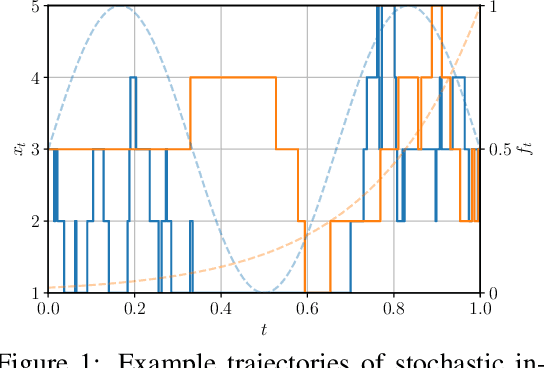
Abstract:Discrete diffusion models have gained increasing attention for their ability to model complex distributions with tractable sampling and inference. However, the error analysis for discrete diffusion models remains less well-understood. In this work, we propose a comprehensive framework for the error analysis of discrete diffusion models based on L\'evy-type stochastic integrals. By generalizing the Poisson random measure to that with a time-independent and state-dependent intensity, we rigorously establish a stochastic integral formulation of discrete diffusion models and provide the corresponding change of measure theorems that are intriguingly analogous to It\^o integrals and Girsanov's theorem for their continuous counterparts. Our framework unifies and strengthens the current theoretical results on discrete diffusion models and obtains the first error bound for the $\tau$-leaping scheme in KL divergence. With error sources clearly identified, our analysis gives new insight into the mathematical properties of discrete diffusion models and offers guidance for the design of efficient and accurate algorithms for real-world discrete diffusion model applications.
Accelerating Diffusion Models with Parallel Sampling: Inference at Sub-Linear Time Complexity
May 24, 2024
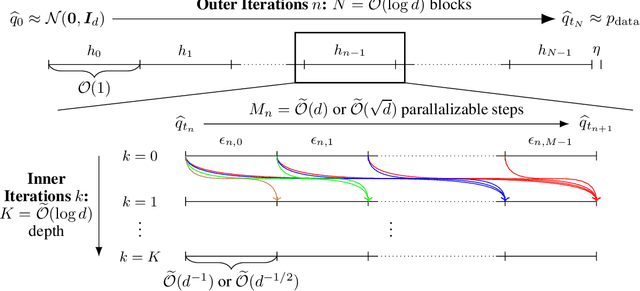
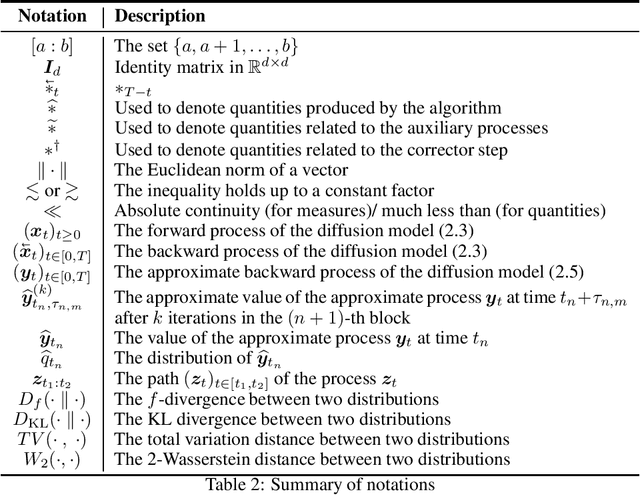
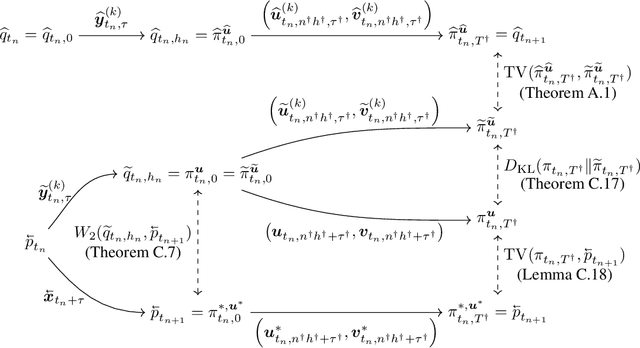
Abstract:Diffusion models have become a leading method for generative modeling of both image and scientific data. As these models are costly to train and evaluate, reducing the inference cost for diffusion models remains a major goal. Inspired by the recent empirical success in accelerating diffusion models via the parallel sampling technique~\cite{shih2024parallel}, we propose to divide the sampling process into $\mathcal{O}(1)$ blocks with parallelizable Picard iterations within each block. Rigorous theoretical analysis reveals that our algorithm achieves $\widetilde{\mathcal{O}}(\mathrm{poly} \log d)$ overall time complexity, marking the first implementation with provable sub-linear complexity w.r.t. the data dimension $d$. Our analysis is based on a generalized version of Girsanov's theorem and is compatible with both the SDE and probability flow ODE implementations. Our results shed light on the potential of fast and efficient sampling of high-dimensional data on fast-evolving modern large-memory GPU clusters.
Ensemble-Based Annealed Importance Sampling
Jan 28, 2024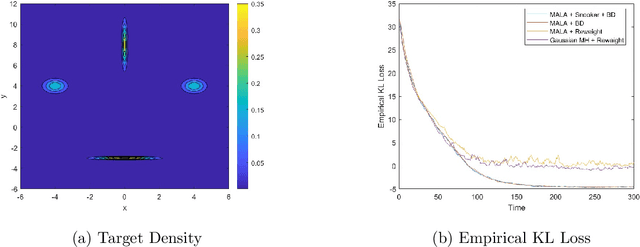
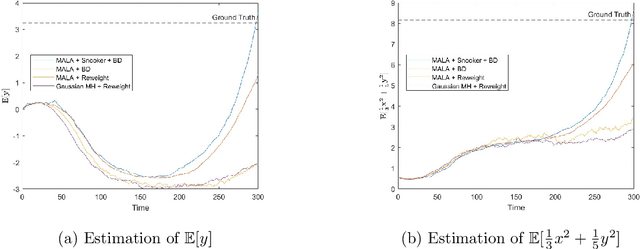


Abstract:Sampling from a multimodal distribution is a fundamental and challenging problem in computational science and statistics. Among various approaches proposed for this task, one popular method is Annealed Importance Sampling (AIS). In this paper, we propose an ensemble-based version of AIS by combining it with population-based Monte Carlo methods to improve its efficiency. By keeping track of an ensemble instead of a single particle along some continuation path between the starting distribution and the target distribution, we take advantage of the interaction within the ensemble to encourage the exploration of undiscovered modes. Specifically, our main idea is to utilize either the snooker algorithm or the genetic algorithm used in Evolutionary Monte Carlo. We discuss how the proposed algorithm can be implemented and derive a partial differential equation governing the evolution of the ensemble under the continuous time and mean-field limit. We also test the efficiency of the proposed algorithm on various continuous and discrete distributions.
When can Regression-Adjusted Control Variates Help? Rare Events, Sobolev Embedding and Minimax Optimality
May 25, 2023

Abstract:This paper studies the use of a machine learning-based estimator as a control variate for mitigating the variance of Monte Carlo sampling. Specifically, we seek to uncover the key factors that influence the efficiency of control variates in reducing variance. We examine a prototype estimation problem that involves simulating the moments of a Sobolev function based on observations obtained from (random) quadrature nodes. Firstly, we establish an information-theoretic lower bound for the problem. We then study a specific quadrature rule that employs a nonparametric regression-adjusted control variate to reduce the variance of the Monte Carlo simulation. We demonstrate that this kind of quadrature rule can improve the Monte Carlo rate and achieve the minimax optimal rate under a sufficient smoothness assumption. Due to the Sobolev Embedding Theorem, the sufficient smoothness assumption eliminates the existence of rare and extreme events. Finally, we show that, in the presence of rare and extreme events, a truncated version of the Monte Carlo algorithm can achieve the minimax optimal rate while the control variate cannot improve the convergence rate.
Physics-Informed Neural Operator for Learning Partial Differential Equations
Nov 06, 2021
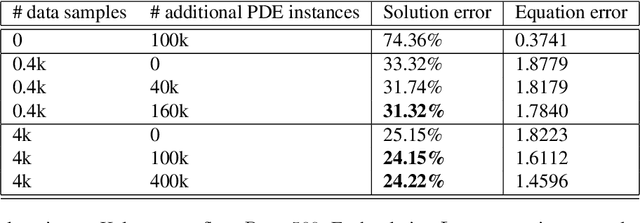
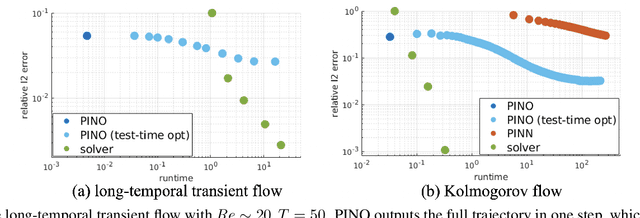

Abstract:Machine learning methods have recently shown promise in solving partial differential equations (PDEs). They can be classified into two broad categories: approximating the solution function and learning the solution operator. The Physics-Informed Neural Network (PINN) is an example of the former while the Fourier neural operator (FNO) is an example of the latter. Both these approaches have shortcomings. The optimization in PINN is challenging and prone to failure, especially on multi-scale dynamic systems. FNO does not suffer from this optimization issue since it carries out supervised learning on a given dataset, but obtaining such data may be too expensive or infeasible. In this work, we propose the physics-informed neural operator (PINO), where we combine the operating-learning and function-optimization frameworks. This integrated approach improves convergence rates and accuracy over both PINN and FNO models. In the operator-learning phase, PINO learns the solution operator over multiple instances of the parametric PDE family. In the test-time optimization phase, PINO optimizes the pre-trained operator ansatz for the querying instance of the PDE. Experiments show PINO outperforms previous ML methods on many popular PDE families while retaining the extraordinary speed-up of FNO compared to solvers. In particular, PINO accurately solves challenging long temporal transient flows and Kolmogorov flows where other baseline ML methods fail to converge.
Machine Learning For Elliptic PDEs: Fast Rate Generalization Bound, Neural Scaling Law and Minimax Optimality
Oct 13, 2021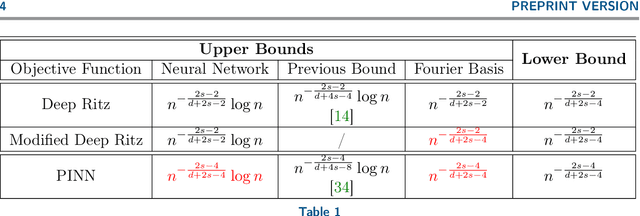
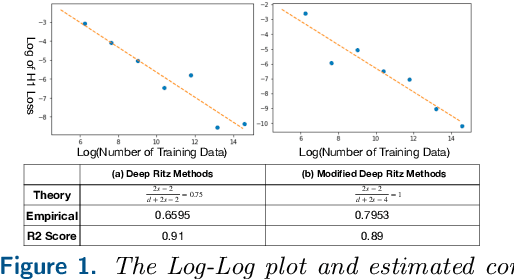
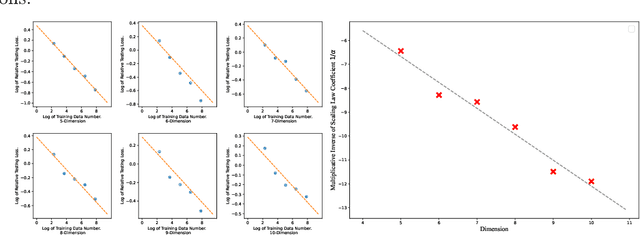
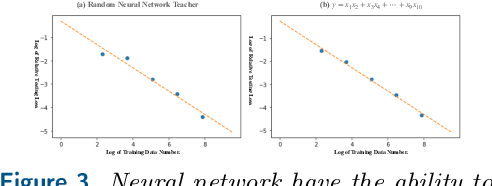
Abstract:In this paper, we study the statistical limits of deep learning techniques for solving elliptic partial differential equations (PDEs) from random samples using the Deep Ritz Method (DRM) and Physics-Informed Neural Networks (PINNs). To simplify the problem, we focus on a prototype elliptic PDE: the Schr\"odinger equation on a hypercube with zero Dirichlet boundary condition, which has wide application in the quantum-mechanical systems. We establish upper and lower bounds for both methods, which improves upon concurrently developed upper bounds for this problem via a fast rate generalization bound. We discover that the current Deep Ritz Methods is sub-optimal and propose a modified version of it. We also prove that PINN and the modified version of DRM can achieve minimax optimal bounds over Sobolev spaces. Empirically, following recent work which has shown that the deep model accuracy will improve with growing training sets according to a power law, we supply computational experiments to show a similar behavior of dimension dependent power law for deep PDE solvers.
 Add to Chrome
Add to Chrome Add to Firefox
Add to Firefox Add to Edge
Add to Edge